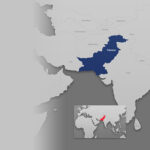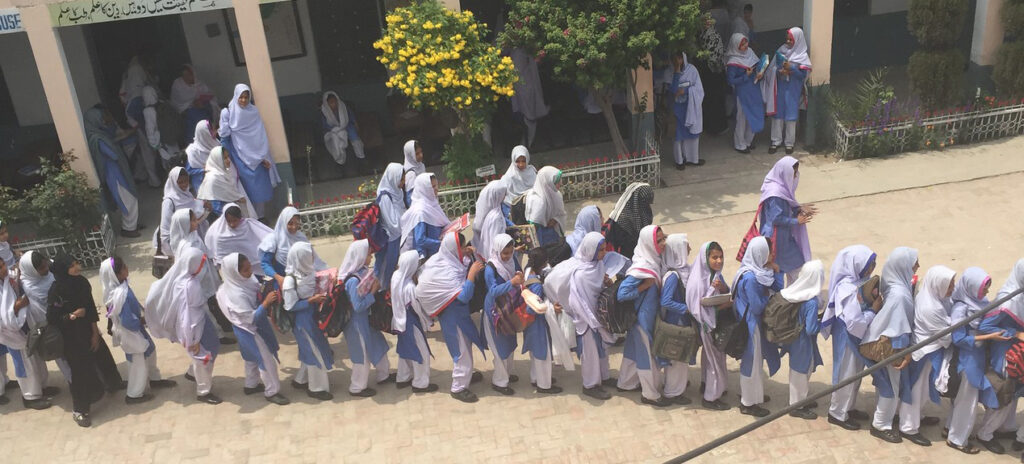- Home
- About Us
- Our Work
- Initiatives
- Disaster Relief
- Hospital and Clinic Projects & Support
- Education & School Support
- Refugee Support
- Healthcare Education & Outreach
- Healthcare Capacity Building & Health Systems Strengthening
- Mobile Clinic Outreach
- Economic Stability & Livelihood
- Community Support
- Psychological Trauma Support
- Health Research
- News & Updates
- Get Involved

Menstrual Hygiene Management and School Retention
TURNING TABOO INTO NORMALCY AND SHAME INTO DIGNITY
NOVEMBER 07, 2016 - PAKISTAN

Fear and Confusion
A COMMON STORY
“Ah! Oh my god!” A terrified young girl runs out of the bathroom and down the stairs calling out, “Daddy!” when a friend of the family stops her and asks what’s wrong. “I’m hemorrhaging!” she replies out of breath and desperate. Fortunately, the friend of the family is a woman, a woman who calmly explains that the girl has experienced her first period. As the girl’s confusion and fear subsides, the doorbell rings. Upon answering, she finds her best friend, a boy, who innocently suggests that they go swimming. Angered by this, the girl pushes her friend to the ground yelling, “Get out of here! And don’t come back for five to seven days!”
This is one of my favorite scenes from the 1991 film, My Girl. I saw this movie when I was five years old and had no idea what they were talking about. I can remember standing in the back of a pickup truck at the drive-in and asking my sister what it all meant. She wouldn’t tell me. I deduced, even at five, that this was one of those uncomfortable subjects that I wasn’t supposed to know about and I already felt embarrassed for asking.
But I had a clue. My mother never talked to me about menstruation, but I watched a 20-minute video in 5th grade that I guess explained it (I wasn’t really paying attention). Sure, when I got to college I googled, “Why do women get periods?” the very first day I was alone with the Internet. But I had the gist. It came around once a month. I needed supplies for which my mother willingly gave me money. It was fairly excruciating to ask for the money (because I had to admit why I needed it) and I felt as though I was disappointing her every time, but it was still available to me.
But what if it wasn’t? Can you imagine having no knowledge of what a period is before experiencing it? In Pakistan, this is usually the case. Think about it. You’re 12 years old, sitting in class, and suddenly your lower abdominals begin to hurt. What is this? Something I ate? Then you begin to feel a bit wet. Not normal. You go to the lavatory when you can, but there are boys around. A few of them make fun of you as you wait, but there aren’t separate facilities for the girls. There’s nowhere to go. You mentally assess your surroundings for physical threats and do a quick cost/benefit analysis in regards to hanging around. You don’t want to get physically attacked. Finally, you can go in and you discover it. Blood. Your mind is racing, heart is pumping. Am I sick? Dying? What is happening to me? There is no one to tell you. You remember overhearing something about bleeding at some point, but you weren’t supposed to know. And you deduced that this was one of those uncomfortable subjects that people don’t talk about. You feel the shame now. It is nausea and sadness, your legs weaken and shake. You search for something to catch the blood, but you’re in traditional Pakistani dress and therefore have no panties. Nothing to hold up the spare bits of cloth you managed to piece together and no water to wash the dripping blood from your legs. What do you do? I would probably run home.
Not much solace is found there. When you tell your mother what’s happening she hushes you, whispers that you are a woman now and can have children and that from now on it is your job to hide this from everyone. There are no pads and certainly no tampons. Way too expensive. You use reusable cloth and hold it up with ill-fitting panties. But you absolutely do not wash yourself. You’re not supposed to bathe if you’re bleeding. So you get infections. And you miss school. You can’t sit in class and risk bleeding through your clothes. You can’t go to the lavatory where someone might see. And now you have a fever. You’re behind in your schoolwork because you missed a week last month as well. You might as well drop out. Over the course of your adolescence, through whispers, you glean as much information as you can about this process and yet, you wonder how much of what you’ve heard is true.

Educational Implications
MENSTRUAL HYGIENE MANAGEMENT RESEARCH PROJECT
If you found the above scene alarming, imagine how it must feel to experience that kind of trauma on a monthly basis. According to RMF Country Director of Pakistan, Dr. Rubina Mumtaz, even teachers, who should be champions of education, are reluctant to talk about menstruation in an accurate, medical manner and even propagate the taboos prevalent in Pakistani culture.
What is it about periods that makes people so uncomfortable? Is it the blood? The sexual implications? The perceived loss of childhood and innocence? It’s a perfectly normal biological process experienced by half the world. If the lining of the uterine wall is not needed to nourish an embryo it has to go and this is how the body does it.
So, what to do?
Dr. Mumtaz reported to RMF, “Despite the proven public health impacts of schooling, three quarters of all eligible [Pakistani] girls are out of school, and 77% of those attending school will drop out before graduation. Many barriers prevent young women from attending or completing school but one of the most under-researched is menarche.”
Therefore, Real Medicine Foundation has partnered with Professor Dr. Marni Sommer of Columbia University and gained funding from Grow N Know Inc (G&K) to launch a research study to “explore the knowledge gap of how the onset of menstruation and puberty influences the Pakistani girls’ school-going experiences, including school retention, and to develop the Pakistan girls’ puberty book in line with G&K’s model of similar puberty books in low and middle-income countries, with the aim to promote young women’s health and education during pubertal transitions.” In other words, RMF’s objective is to find out exactly how menstrual health (knowledge or lack thereof) affects Pakistani girls’ educational status and to determine what the girls want and need to know to help them achieve an education.
The research design of this study is a comparative case study in rural and urban Punjab, as well as a replicate follow-up study in the Province of Balochistan (in which RMF partners with Columbia University, New York, and UNICEF) to contribute data for the purpose of creating the Pakistan Girls’ Puberty book. Furthermore, in October 2016, RMF learned of UNICEF’s support to carry out the same study in Sindh, making the research more comprehensive as it will complete the research across the nation.
*The specific aims of the study are
- To describe local cultural understandings and meanings of menarche in urban and rural Pakistan through the use of ethnographic observations, interviews and participatory activities with adolescent young women and the adults who play key roles in the lives of school-aged young women.
- To explore, through comparative case studies of young women’s lives, the ways in which local cultural meanings about menarche and menstruation interact with sanitary technology, school design, and peer group relations, to create intolerable menstrual-related stigma that leads to young women dropping out of school.
- To utilize adolescent young women’s own recommendations for improving the pubertal and menstrual management related guidance adolescent girls receive through the development of a girls’ puberty book in Pakistan.
RMF is fully responsible for the creation of the puberty book (to be published in December 2016) and it will be based on sim

No Judgement
RESPECTING PAKISTANI CULTURE
Right now, you may be asking yourself, “But why don’t the women of Pakistan just explain menstruation to their daughters?” Unfortunately, it’s not that easy. For years and years, these austere cultural beliefs have been developed and rooted in the minds of the people. It may be easy to judge; in the modern American political and cultural climate, we could get pretty prideful about our attitudes toward periods. Many families speak comfortably and naturally about menstruation and some even throw period parties for their daughters to celebrate their budding womanhood. However, it was not that long ago that women were warned not to swim with a tampon in or they would sink. Or that my mother looked at me with utter disappointment when I told her I had started my period. One of the most beautiful things about the way RMF operates is that they do not come from a place of judgment.
It does not work to go into an established culture and tell them where they are “wrong.” RMF knows that you have to start where people are and build. The puberty book, therefore, cannot show (even in silhouette) a naked body. It cannot use the word “vagina.” But Pakistani girls are eager to learn. They want answers to their questions, and this book will do just that. Furthermore, it may be tempting to say, “Let’s send supplies! Pads! Tampons! For everyone!” No. It’s too expensive. Supplies must be sustainable and manageable for the culture, meeting the socio-economic challenges presented. We’ve seen this before. When RMF supported Lwala Community Alliance began Grace Ochieng’s New Vision Women’s Sewing Cooperative, girls had access to reusable menstrual supplies and school attendance rose (as well as their economic stability).
Every generation wants a better life for their children. Through RMF’s work on the Pakistan Girls’ Puberty book (in partnership with Columbia University, G&K, and UNICEF), a new generation of girls will have the opportunity to grow up to become educated women. Women whose first thought when they see blood won’t be, “I’m hemorrhaging!” or “Am I dying?” Women who are educated about their bodies, who are empowered by their knowledge and ability to manage menses, and who are able stay in school. By developing their minds and improving their economic stability, Pakistani girls will have the tools they need for future generations to turn taboo into normalcy and shame into dignity.
Learn more about the Menstrual Health Management Research Project in Punjab Balochistan.

REAL MEDICINE FOUNDATION PAKISTAN
Initiatives
- Disaster Relief
- Hospital & Clinic Projects Support
- Education & School Support
- Refugee Support
- Malnutrition Eradication
- mHealth Programs
- Healthcare Education & Outreach
- Healthcare Capacity Building & Systems
- Economic Stability & Livelihood
- Flood Victims Healthcare Outreach
- Health Research
- HIV/AIDS Prevention & Treatment
- Medical Support
- Mobile Clinics
- Psychological Support
Designed & Developed by Socialoctors
